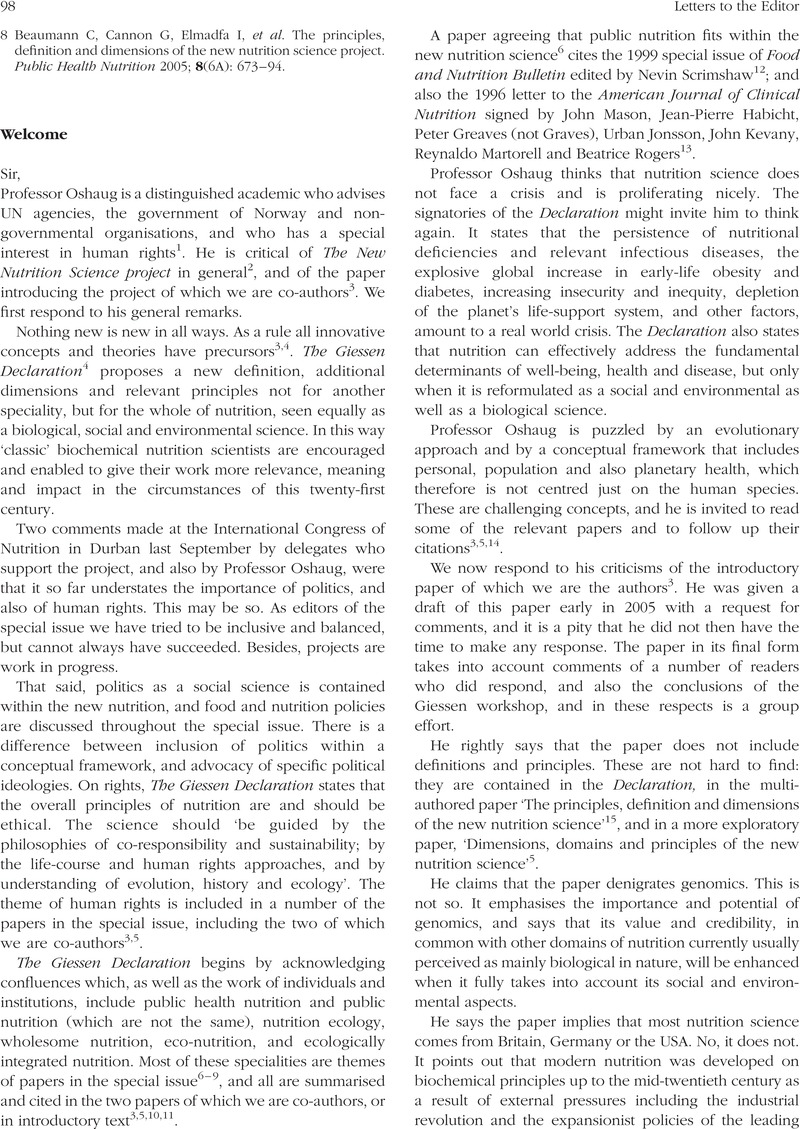No CrossRef data available.
Article contents
Welcome
Published online by Cambridge University Press: 02 January 2007
Abstract
An abstract is not available for this content so a preview has been provided. As you have access to this content, a full PDF is available via the ‘Save PDF’ action button.

Information
- Type
- Letters to the Editor
- Information
- Copyright
- Copyright © The Authors 2006
References
1Oshaug, A. Developing voluntary guidelines for implementing the right to adequate food: anatomy of an intergovenmental process [Chapter 11]. In: Eide, W, Kracht, U, eds. Food and Human Rights in Development. Vol. 1. Legal and Institutional Dimensions and Selected Topics. Antwerp: Intersentia, 2005.Google Scholar
2Leitzmann, C, Cannon, G, eds. The New Nutrition Science project. Public Health Nutrition 2005; 8(6A): 667–804.Google Scholar
3Cannon, G, Leitzmann, C. The new nutrition science project. Public Health Nutrition 2005; 8(6A): 673–94.CrossRefGoogle Scholar
4The Giessen Declaration. Public Health Nutrition 2005; 8(6A): 783–6 Also available at http://www.iuns.orgGoogle Scholar
5Leitzmann, C, Cannon, G. Dimensions, domains and principles of the new nutrition science. Public Health Nutrition 2005; 8(6A): 787–94.CrossRefGoogle Scholar
6Beaudry, M, Delisle, H. Public('s) nutrition. Public Health Nutrition 2005; 8(6A): 743–8.CrossRefGoogle ScholarPubMed
7Leitzmann, C. Wholesome nutrition: a suitable diet for the new nutrition science project. Public Health Nutrition 2005; 8(6A): 753–9.CrossRefGoogle ScholarPubMed
8Wahlqvist, M. The new nutrition science: sustainability and development. Public Health Nutrition 2005; 8(6A): 766–72.CrossRefGoogle Scholar
9Lang, T. Food control or food democracy? Re-engaging nutrition with society and the environment. Public Health Nutrition 2005; 8(6A): 730–7CrossRefGoogle Scholar
12Scrimshaw, N, ed. Public nutrition. Food and Nutrition Bulletin 1999; 20(3): 279–343.CrossRefGoogle Scholar
13Mason, J, Habicht, J-P, Greaves, P, Jonsson, U, Kevany, J, Martorell, R, Rogers, B. Public nutrition [letter]. American Journal of Clinical Nutrition 1996; 63: 399–400.CrossRefGoogle ScholarPubMed
14McMichael, A. Integrating nutrition with ecology: balancing the health of humans and biosphere. Public Health Nutrition 2005; 8(6A): 706–15.CrossRefGoogle ScholarPubMed
15Beauman, C, Cannon, G, Elmadfa, I, et al. The principles, definition and dimensions of the new nutrition science. Public Health Nutrition 2005; 8(6A): 695–9.CrossRefGoogle ScholarPubMed
16Lewin, K. In: Lewin, G, ed. Resolving Social Conflicts. Selected Papers on Group Dynamics. New York: Harper and Row, 1948. See also http://santafe.eduGoogle Scholar
17Goonatilake, S. Crippled Minds An Exploration into Colonial Culture. Second impression. Colombo, Sri Lanka: Lake House, 1984.Google Scholar
18Uauy, R. Defining and addressing the nutritional needs of populations. Public Health Nutrition 1948; 8(6A): 773–80.CrossRefGoogle Scholar

